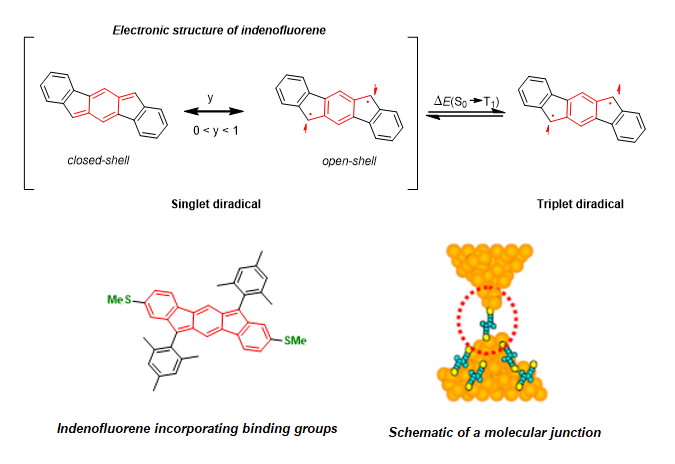Single-Molecule Electrical Conductance Measurements of Novel Organic Biradicals
RESEARCH PROGRAMMES
P1: Nanotechnology for energy harvesting
P2: Quantum materials at the nanoscale
P3: Nanomagnetism for Information and Communication Technologies
PhD PROJECT DESCRIPTION
This PhD project aims to investigate novel organic biradical molecules based on the indenofluorene moiety and to assess their conductance, spintronic and thermoelectric performance in single molecule junctions. The candidate will participate in the project BIINTEL (PID2021-127964NB-C21) which combines the synthetic group of Alba Millán (University of Granada, Spain) and the molecular electronics group led by Edmund Leary (IMDEA Nanociencia). The synthesis of new organic biradicals will be undertaken at UGR whilst the transport measurements will be performed at IMDEA Nanociencia.
Biradicals have an even number of electrons, but with two existing in an unpaired state. This open-shell electronic structure makes biradicals interesting candidates for applications in key areas of molecular electronics and materials science, such as molecular magnets, and as efficient conductors of electrical charge. Furthermore, such compounds show great promise for thermoelectric devices thanks to their typically sharp transport resonances in energy spectra. This is expected to generate large Seebeck coefficients, essential for making highly efficient devices. The aim is to improve on current technology which relies on materials with toxic elements like bismuth telluride.
Indenofluorenes are relatively stable, synthetically flexible, organic compounds which exist in the ground state as a mixture of open and closed shell electronic configurations. Interestingly, the singlet-triplet energy gap can be rather small, meaning interconversion can occur simply by changing the temperature. This opens up the possibility of making temperature sensitive devices, if the conductance can be shown to depend on the electronic configuration. Further testing will also look at bias voltage control over the switching.
The candidate will be tasked with characterizing each compound using the scanning tunneling microscopy break-junction technique. This forms single molecule junctions which will then be subjected to further characterization using current-voltage (I-V) spectroscopy and thermopower measurements. Initially, gold electrodes will be used, which are robust and stable to oxidation. Gold is, however, non-magnetic and other metals will be explored to probe spin transport phenomena. The candidate will develop the methodology necessary to work with these metals, including nickel, cobalt or iron, which are highly sensitive to surface oxidation. Protocols will be developed to use these metals as electrodes, leaving their surfaces free from oxide and thus able to bind directly to individual molecules. Electrochemical techniques as well as environmental chambers will be explored. As part of the PhD, a secondment of 3-6 months at IBM Europe is envisaged to undertake complementary characterization of the compounds.

APPLICANT’S REQUIREMENTS
An ideal candidate would have a degree in Chemistry, Physics or Engineering. Previous knowledge in electrochemistry, nanoelectronics or spintronics will be valued. They will also have completed (or be about to complete) a Master’s degree.
Prior knowledge of scientific acquisition/analysis programs (such as Labview or Matlab) will be valued, as will demonstration of programming skills with these or other programs.
It is expected that the successful candidate will be independent, creative, curiosity-driven, motivated to explore solutions to difficult scientific problems, and have a strong work ethic.
A good knowledge of English is required.
RESEARCH GROUP DESCRIPTION
The molecular electronics group in IMDEA Nanociencia is led by Dr Edmund Leary. He is PI of several projects including “Exploring Antiaromaticity in Single Molecule Devices” (2019-T1/IND-16384) and “Biradicals for Spintronic and Thermoelectric Applications” (PID2021-127964NB-C21). The group combines the research activities of several PIs including Dr Teresa Gonzalez (Neural interfaces) and Nicolas Agrait (Thermopower at the nanoscale). At present we have one PhD student working in the laboratory. The new candidate would benefit the group greatly and would work alongside the current student.
RESEARCH SUPERVISOR
Dr Edmund Leary
edmund.leary@imdea.org
Research Group website: https://nanociencia.imdea.org/molecular-electronics-laboratory/group-home
